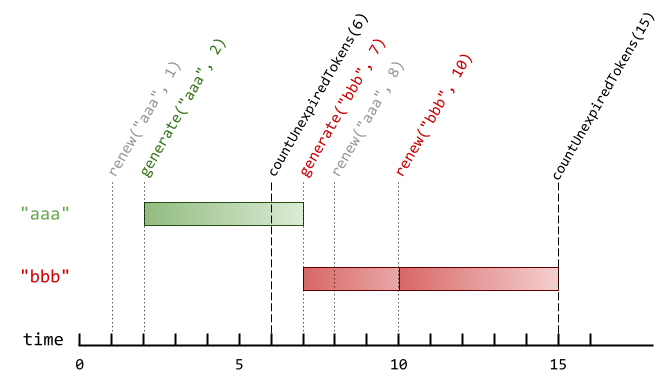你需要设计一个包含验证码的验证系统。每一次验证中,用户会收到一个新的验证码,这个验证码在 currentTime 时刻之后 timeToLive 秒过期。如果验证码被更新了,那么它会在 currentTime (可能与之前的 currentTime 不同)时刻延长 timeToLive 秒。
请你实现 AuthenticationManager 类:
AuthenticationManager(int timeToLive)构造AuthenticationManager并设置timeToLive参数。generate(string tokenId, int currentTime)给定tokenId,在当前时间currentTime生成一个新的验证码。renew(string tokenId, int currentTime)将给定tokenId且 未过期 的验证码在currentTime时刻更新。如果给定tokenId对应的验证码不存在或已过期,请你忽略该操作,不会有任何更新操作发生。countUnexpiredTokens(int currentTime)请返回在给定currentTime时刻,未过期 的验证码数目。
如果一个验证码在时刻 t 过期,且另一个操作恰好在时刻 t 发生(renew 或者 countUnexpiredTokens 操作),过期事件 优先于 其他操作。
示例 1:
输入: ["AuthenticationManager", "renew", "generate", "countUnexpiredTokens", "generate", "renew", "renew", "countUnexpiredTokens"] [[5], ["aaa", 1], ["aaa", 2], [6], ["bbb", 7], ["aaa", 8], ["bbb", 10], [15]] 输出: [null, null, null, 1, null, null, null, 0]解释: AuthenticationManager authenticationManager = new AuthenticationManager(5); // 构造 AuthenticationManager ,设置
timeToLive= 5 秒。 authenticationManager.renew("aaa", 1); // 时刻 1 时,没有验证码的 tokenId 为 "aaa" ,没有验证码被更新。 authenticationManager.generate("aaa", 2); // 时刻 2 时,生成一个 tokenId 为 "aaa" 的新验证码。 authenticationManager.countUnexpiredTokens(6); // 时刻 6 时,只有 tokenId 为 "aaa" 的验证码未过期,所以返回 1 。 authenticationManager.generate("bbb", 7); // 时刻 7 时,生成一个 tokenId 为 "bbb" 的新验证码。 authenticationManager.renew("aaa", 8); // tokenId 为 "aaa" 的验证码在时刻 7 过期,且 8 >= 7 ,所以时刻 8 的 renew 操作被忽略,没有验证码被更新。 authenticationManager.renew("bbb", 10); // tokenId 为 "bbb" 的验证码在时刻 10 没有过期,所以 renew 操作会执行,该 token 将在时刻 15 过期。 authenticationManager.countUnexpiredTokens(15); // tokenId 为 "bbb" 的验证码在时刻 15 过期,tokenId 为 "aaa" 的验证码在时刻 7 过期,所有验证码均已过期,所以返回 0 。
提示:
1 <= timeToLive <= 1081 <= currentTime <= 1081 <= tokenId.length <= 5tokenId只包含小写英文字母。- 所有
generate函数的调用都会包含独一无二的tokenId值。 - 所有函数调用中,
currentTime的值 严格递增 。 - 所有函数的调用次数总共不超过
2000次。
用哈希表存放 token 与对应的过期时间。
class AuthenticationManager:
def __init__(self, timeToLive: int):
self.timeToLive = timeToLive
self.tokens = {}
def generate(self, tokenId: str, currentTime: int) -> None:
self.tokens[tokenId] = currentTime + self.timeToLive
def renew(self, tokenId: str, currentTime: int) -> None:
expire_time = self.tokens.get(tokenId)
if expire_time is None or expire_time <= currentTime:
return
self.tokens[tokenId] = currentTime + self.timeToLive
def countUnexpiredTokens(self, currentTime: int) -> int:
unexpiredCount = 0
for val in self.tokens.values():
if val > currentTime:
unexpiredCount += 1
return unexpiredCount
# Your AuthenticationManager object will be instantiated and called as such:
# obj = AuthenticationManager(timeToLive)
# obj.generate(tokenId,currentTime)
# obj.renew(tokenId,currentTime)
# param_3 = obj.countUnexpiredTokens(currentTime)class AuthenticationManager {
private int timeToLive;
private Map<String, Integer> tokens;
public AuthenticationManager(int timeToLive) {
this.timeToLive = timeToLive;
tokens = new HashMap<>();
}
public void generate(String tokenId, int currentTime) {
tokens.put(tokenId, currentTime + timeToLive);
}
public void renew(String tokenId, int currentTime) {
Integer expireTime = tokens.get(tokenId);
if (expireTime == null || expireTime <= currentTime) {
return;
}
tokens.put(tokenId, currentTime + timeToLive);
}
public int countUnexpiredTokens(int currentTime) {
int unexpiredCount = 0;
for (Integer val : tokens.values()) {
if (val > currentTime) {
++unexpiredCount;
}
}
return unexpiredCount;
}
}
/**
* Your AuthenticationManager object will be instantiated and called as such:
* AuthenticationManager obj = new AuthenticationManager(timeToLive);
* obj.generate(tokenId,currentTime);
* obj.renew(tokenId,currentTime);
* int param_3 = obj.countUnexpiredTokens(currentTime);
*/class AuthenticationManager {
private timeToLive: number;
private map: Map<string, number>;
constructor(timeToLive: number) {
this.timeToLive = timeToLive;
this.map = new Map<string, number>();
}
generate(tokenId: string, currentTime: number): void {
this.map.set(tokenId, currentTime + this.timeToLive);
}
renew(tokenId: string, currentTime: number): void {
if ((this.map.get(tokenId) ?? 0) <= currentTime) {
return;
}
this.map.set(tokenId, currentTime + this.timeToLive);
}
countUnexpiredTokens(currentTime: number): number {
let res = 0;
for (const time of this.map.values()) {
if (time > currentTime) {
res++;
}
}
return res;
}
}
/**
* Your AuthenticationManager object will be instantiated and called as such:
* var obj = new AuthenticationManager(timeToLive)
* obj.generate(tokenId,currentTime)
* obj.renew(tokenId,currentTime)
* var param_3 = obj.countUnexpiredTokens(currentTime)
*/use std::collections::HashMap;
struct AuthenticationManager {
time_to_live: i32,
map: HashMap<String, i32>,
}
/**
* `&self` means the method takes an immutable reference.
* If you need a mutable reference, change it to `&mut self` instead.
*/
impl AuthenticationManager {
fn new(timeToLive: i32) -> Self {
Self {
time_to_live: timeToLive,
map: HashMap::new(),
}
}
fn generate(&mut self, token_id: String, current_time: i32) {
self.map.insert(token_id, current_time + self.time_to_live);
}
fn renew(&mut self, token_id: String, current_time: i32) {
if self.map.get(&token_id).unwrap_or(&0) <= ¤t_time {
return;
}
self.map.insert(token_id, current_time + self.time_to_live);
}
fn count_unexpired_tokens(&self, current_time: i32) -> i32 {
self.map.values().filter(|&time| *time > current_time).count() as i32
}
}
/**
* Your AuthenticationManager object will be instantiated and called as such:
* let obj = AuthenticationManager::new(timeToLive);
* obj.generate(tokenId, currentTime);
* obj.renew(tokenId, currentTime);
* let ret_3: i32 = obj.count_unexpired_tokens(currentTime);
*/
